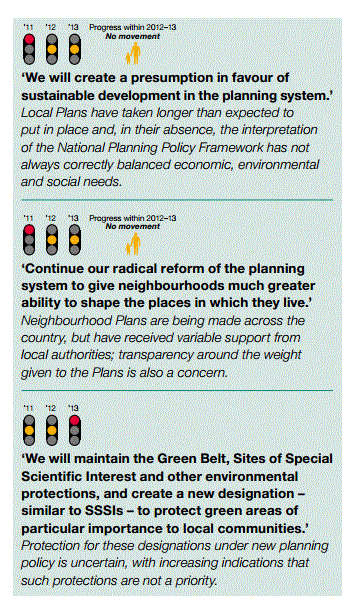Cameron failed to deliver on promise of ‘greenest government ever’ and environmental commitments, say NGOs
In a report called “Nature Check 2013″ the consortium of 41 environmental NGOs has set out a range of environmental commitments made by this government, and their progress on them. The Government has failed to deliver on more than a third of the pledges it made to improve the natural environment and has made “good progress” on less than a fifth. The report shows, comparing progress over the past 3 years, that the Coalition’s environmental record had “steadily worsened” during its time in office and found that 79% of the population believe it has not lived up to its pledge to be the “greenest government ever”. Dr Elaine King, director of the consortium said: “We’re told an economy in crisis is a higher priority than nature in crisis. Yet the Government is missing a huge opportunity – a healthy environment helps the economy and enhances people’s health and wellbeing.” On the pledge “We will maintain the Green Belt, Sites of Special Scientific Interest and other environmental protections, and create a new designation – similar to SSSIs”…they are failing.They are making only moderate progress on two others relating to the planning system.
.
Tweet
Cameron failed to deliver on promise of ‘greenest government ever’, say NGOs
Report claims Coalition’s record on the environment has steadily worsened as more than a third of pledges not met
The Wildlife and Countryside Link’s report “Nature Check 2013” –An analysis of the Government’s natural environment commitments
The Government has failed to deliver on more than a third of the pledges it made to improve the natural environment and has made “good progress” on less than a fifth of them, according to research published today.
A report by a consortium of 41 NGOs concluded that the Coalition’s environmental record had “steadily worsened” during its time in office and found that 79 per cent of the population believe it has not lived up to its pledge to be the “greenest government ever”.
“David Cameron promised the greenest government ever. Using the Government’s own promises as a yardstick, these findings show he’s failed to stick to his plan,” said Dr Elaine King, the director of the consortium, known as the Wildlife and Countryside Link.
“We’re told an economy in crisis is a higher priority than nature in crisis. Yet the Government is missing a huge opportunity – a healthy environment helps the economy and enhances people’s health and wellbeing,” she added.
The report, by organisations including the RSPB, WWF, RSPCA and The Wildlife Trusts, said the Government was “falling short” when it came to protecting the green belt, farm animal welfare, developing marine conservation zones and reversing declines in wildlife.
It also criticises the controversial badger cull, designed to reduce bovine tuberculosis in cattle.
The report quotes the Government’s promise to “implement a carefully managed and science-led policy of badger control as part of a balanced package of measures to control bovine TB and to support the cattle industry”. It concludes that it has failed in that and eight other commitments.
“The [bovine TB reduction] policy being implemented is neither balanced nor science-led, especially with regard to the relative lack of resources being directed to sustainable disease control measures, such as badger vaccination,” the report says.
But David Cameron stood by his record.
Asked about those Conservatives who say they can no longer vote for his party because planning reforms have led to more development on greenbelt land, the Prime Minister said: “I think that planning reform is important. It’s important that we build more houses because the average age of the first-time buyer has crept into the 30s and I believe in a socially mobile opportunity society where people can achieve their dream of home ownership.”
Although the report is largely critical of the Coalition, it finds that “some areas show progress, demonstrating that the Government is capable of providing green leadership”.
It praises the Government for making good progress in helping to develop a Common Fisheries Policy, a strong response to ash dieback disease and providing global leadership on protecting elephants, rhinos and whales.
The report rates four of the Government’s 25 commitments to the natural environment as green (showing good progress) – or 16 per cent – with ranked 12 amber (moderate progress) and nine – or 36 per cent – red (failing).
Of the commitments which were rated in a similar report a year ago, 20 per cent have got worse and only 10 per cent have improved.
.
.
Land Use Planning pledges
In the Land Use Planning section of the report, there are three items rated (for 2011, 2012 and 2013). These have not done well – amber light means “moderate progress” and red light means “failing”. Page 41 of http://www.wcl.org.uk/docs/Link_Nature_Check_Report_November_2013.pdf
.
.
The Wildlife and Countryside Link’s report “Nature Check 2013” –
An analysis of the Government’s natural environment commitments
.
.

